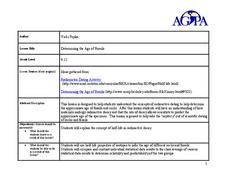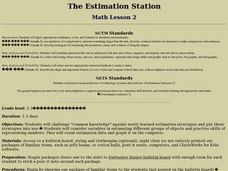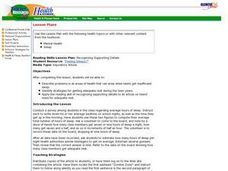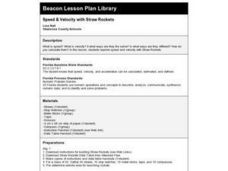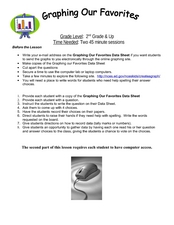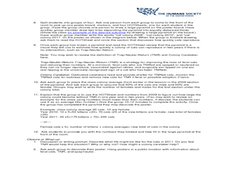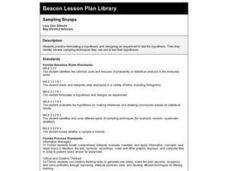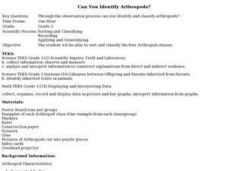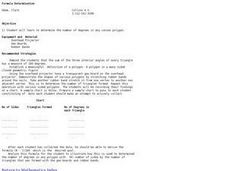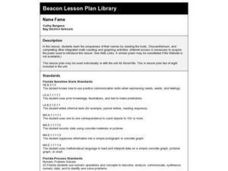Texas Instruments
TI-Nspire™
We landed on the moon with less computing capabilities than you can find in this app! Here is a multiple function calculator that takes all the power you get from a handheld and adds the wonderful large screen that only a tablet can...
Curated OER
Alphabet Cards: Centipedes
For this alphabet cards worksheet, students cut apart 52 cards that feature an upper or lower case alphabet letter in a cartoon centipede shape. This is Zaner-Bloser style; one upper or lower case letter per card.
Curated OER
My Springtime Coloring Book
In this springtime coloring worksheet, students create a book of springtime pictures by coloring each picture and putting them together in a book. There are 6 pictures for students to color.
Curated OER
Determining the Age of Fossils
Students examine the concept of radioactive dating. In this radioactive dating lesson, students investigate how to determine the ages of fossils and rocks as they learn about half-life radioactive decay.
Curated OER
The Estimation Station
Young scholars challenge "common knowledge" against newly learned estimation strategies and put those strategies into use. They consider variables in estimating different groups of objects and practice skills of representing numbers.
Curated OER
My Elephant Counting Book (1 to 10)
In this elephant counting book learning exercise, students cut out, color and assemble a mini book with the numbers 1 to 10. Each page has a number and the corresponding pictures of elephants.
Curated OER
Graphing Using Cookies
Students differentiate between bar graphs, line graphs, pictographs and bar graphs. After participating in a hands-on cookie activity, students label and draw their own graphs.
Curated OER
Feeling Sleepy
Students read the article "Feeling Sleepy?" students compare the article to a sleep survey they do in their class, describe problems that can arise from not getting enough sleep and identify strategies for getting adequate sleep.
Curated OER
Ratio and Proportion
Students explore ratios and proportions. In this ratios lesson, students work in groups to identify the ratio of boys to girls, as well as the ratio of vowels to consonants in their names. Given a bag of candy, students work in groups to...
Curated OER
Speed & Velocity with Straw Rockets
Eighth graders explore calculating speed and velocity with Straw Rockets.
Curated OER
Inductive vs. Deductive Proof
Twelfth graders differentiate between inductive and deductive proofs. In this differentiating between inductive and deductive proofs lesson, 12th graders compare strengths and weaknesses of each type of proof. Students discuss an...
Curated OER
Graphing Our Favorites
Second graders use a computer program to follow directions and graph their favorite things into a bar graph. In this graphing lesson plan, 2nd graders have 30 choices of favorite things to graph.
Curated OER
The Tale of the Feral - Care and Multiplication of Feral Cats
Young scholars differentiate between a feral cat and a domesticated cat. For this cat lesson plan, students use the scientific method, calculate averages, solve story problems, and learn how a caretaker can help a feral colony live safely.
Curated OER
Dogfighting and the Community
Young scholars discover the threats to dogs by investigating dogfighting. In this animal cruelty lesson, students read the state laws pertaining to animal safety and dogfighting. Young scholars compile dogfighting facts into a poster...
Curated OER
Lesson 4: A Class Census
Students compile results in their own census. In this early childhood U. S. Census lesson plan, students collect and represent information about events in simple charts.
Curated OER
Playing With Probability
Students rotate through work stations where they compute problems of theoretical and experimental probability. In this probability lesson plan, students use simulations of a lottery system.
Curated OER
Sampling Snoops
Students practice formulating a hypothesis and designing an experiment to test the hypothesis. They identify several sampling techniques they can use to test their hypotheses.
Curated OER
How Big Is Your House?
Students create a scale drawing of their own homes. They use geometric formulas to find the area of each room and the total area of the home.
Curated OER
Can You Identify Arthropods?
Third graders sort and classify the four Arthropod classes. They are given puzzle pieces of one Arthropod example. Each group is to put their puzzle together, glue it on a piece of construction paper and label the ir puzzle.
Curated OER
Plants and Animals Depend Upon One Another
First graders study plants and animals and how they depend on one another. They also study that plants give energy to animals and provide oxygen needed for life. Finally, 1st graders give examples of the roles plants and animals play...
Curated OER
Standard Linear Form
Ninth graders identify and describe the x-intercept as the place where the line crosses the x-axis as it applies to football. They create their own differentiations to reinforce the distinction between the x-intercept and the...
Curated OER
Formula Determination
Students derive a formula for the interior degrees in any convex polygon. In this geometric figure lesson, students determine the shapes of various polygons and the number of triangles formed. They use this information to derive the...
Curated OER
Avalanche!
Students build a model representing a snow-covered mountain out of flour, sugar, and potato flakes. Then they use the model to recreate an avalanche.
Curated OER
Name Fame
First graders learn the uniqueness of their names by reading the book, Chrysanthemum, and completing other integrated math counting and graphing activities.





